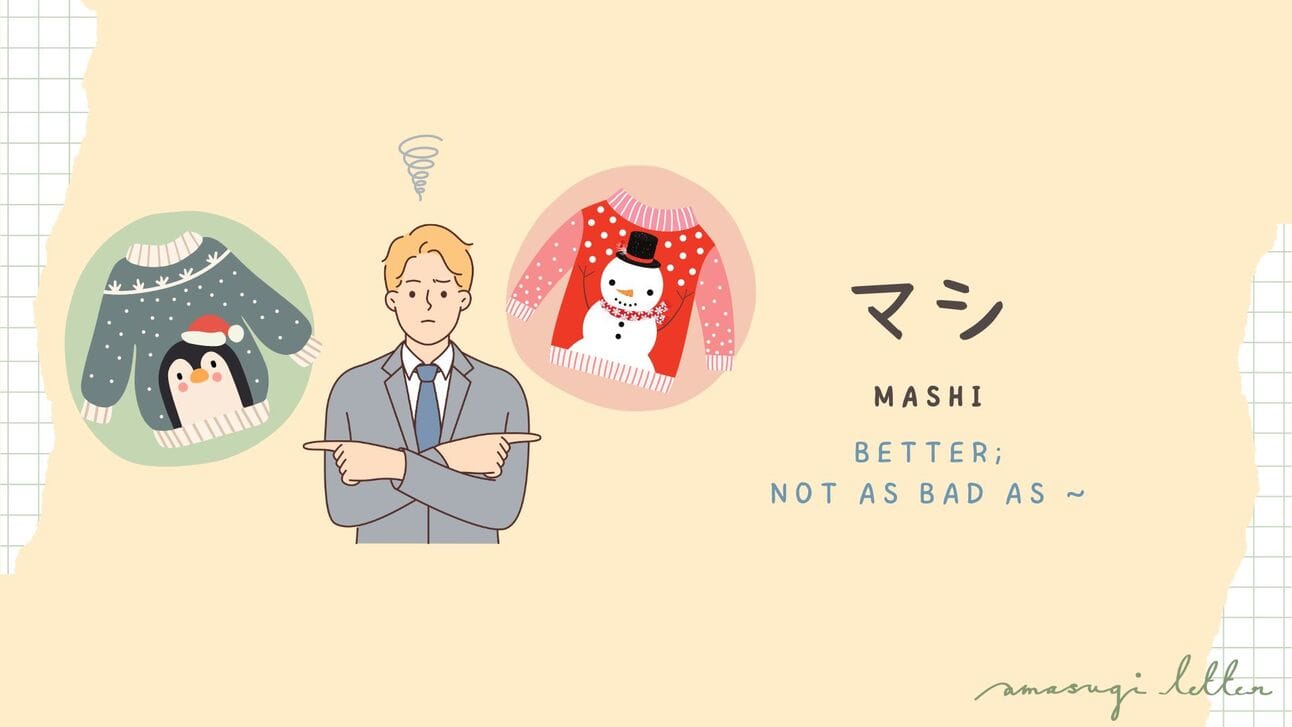- Amasugi Letter
- Posts
- 何の言葉19 マシ (mashi)
何の言葉19 マシ (mashi)
Amasugi Letter

Hi!
It’s been more than half of 2024, we’ve been learning quite a few words along the way. As a language learner myself, I’ve been learning so much while doing this newsletter with my friend, who is a native Japanese.
The other day I was watching Hananoi-kun to Koi no Yamai, and I kept hearing the word あっという間 (attoiuma). So we are proud that we chose common words to share in 何の言葉 that you wouldn’t find in a textbook!
Today’s word is useful if you are someone who is picky or not easily satisfied:


What does マシ mean?
マシ means “acceptable”, not as bad as (compared with other options)”, or “better than”.
It’s like saying, “They are not great options, but if I had to choose between A or B, B is マシ (it is better to choose B)”.
You can use マシ in a few ways:
~よりマシ (yori mashi) = better than ~
For example,
今の仕事は大変だけど、前の仕事よりマシだ。
(Ima no shigoto wa taihen dakedo, mae no shigoto yori mashi da.)
My current job is tough, but it’s better than the previous job.
~の方がマシ (no hou ga mashi) = ~ is better
For example,会社で風邪を広めるより、休む方がマシだよ。
(Kaisha de kaze wo hiromeru yori, yasumu hou ga mashi dayo.)
It’s better to take a day off than spreading your cold at the office.まだマシ (mada mashi) = still better
For example,
キャベツもナスも嫌いだけど、キャベツの方がまだマシ。
(Kyabetsu mo nasu mo kirai dakedo, kyabetu no hou ga mada mashi.)
I don’t like neither cabbage nor eggplant, but cabbage is still better.
How to write マシ:
It’s original form is most likely hiragana: まし, but it is often written in Katakana to distinguish from other Hiragana-written words. (However, we don’t recommend using this word in a business setting)
Similar English phrases:
“~ is better (than)”
“not as bad as ~”
“acceptable”

💡 Difference between の方がいい vs の方がまし
When at a restaurant, someone asks you which seafood do you prefer:
“Do you prefer prawn or crab?“
If you prefer crab, you can say:
「エビよりカニの方がいい」=I prefer crab more than prawn.
If you don’t prefer both prawn and crab, but you don’t have any other option, you can say:
「エビよりカニの方がマシ」=(I don’t prefer either but if I have to choose) I will choose crab over prawn.
With マシ, you can express that you are not satisfied with the available options. This is useful if you are a picky eater. 🤣

1.日記をだれかに読まれるなら、死んだ方がマシ!
(Nikki wo dareka ni yomareru nara, shinda hou ga mashi!)
I’d rather die than allow someone to read my diary!
2.今日も暑いけど、昨日よりはまだマシだね。
(Kyou mo atsui kedo, kinou yori wa mada mashi dane.)
It’s hot today too, but it’s still better than yesterday, right?
3.ボロボロの傘だけど、無いよりはマシかも。
(Boroboro no kasa dakedo, nai yori wa mashi kamo.)
This is an old, battered umbrella, but it would be better than without it.
4.「体調はどう?」「ちょっとマシになったよ。」
(”Taichou wa dou?” “Chotto mashi ni natta yo.”)
”How are you feeling?” “Now I feel a little bit better.”
5.今日はプレゼンがあるのに、もうちょっとマシなジャケットはなかったの?
(Kyou wa purezen ga aru noni, mou chotto mashi na jaketto wa nakattano?)
You have a presentation today, didn’t you have a better jacket?
Similar Japanese phrases:
よりは良い(yori wa ii)
まだ良い(mada ii)
Let us know if you have any questions about マシ.
Til our next newsletter!👋
Sincerely,
Amasugi Letter
Send us your feedback → [email protected]
Follow us on instagram → @amasugiletter
Check out our website → amasugi-letter.beehiiv.com
Reply